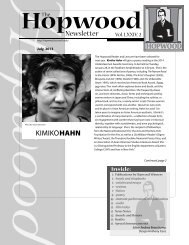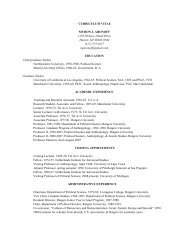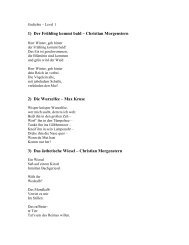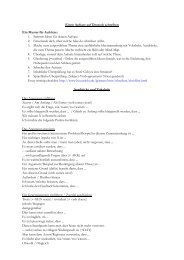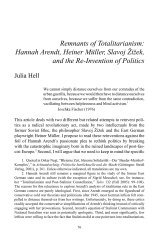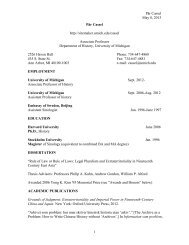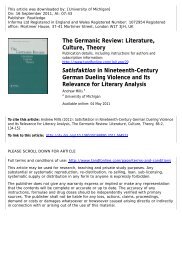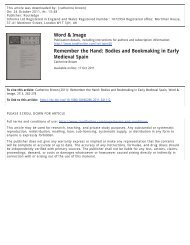Making History Personal: Constantine Cavafy and the Rise of Rome
Making History Personal: Constantine Cavafy and the Rise of Rome
Making History Personal: Constantine Cavafy and the Rise of Rome
Create successful ePaper yourself
Turn your PDF publications into a flip-book with our unique Google optimized e-Paper software.
Frier, “<strong>Making</strong> <strong>History</strong> <strong>Personal</strong>,” page 5<br />
/ picked out in scarlet, in <strong>the</strong> eastern fashion”—an orientalizing touch that recurs in <strong>the</strong> hetaera’s<br />
unexpectedly Jewish name, Leah. In short, <strong>the</strong> setting is not neoclassical, but contemporary to<br />
<strong>the</strong> Hellenistic world <strong>of</strong> Horace’s day. 17<br />
The Hellenistic World in 200 BCE:<br />
Ptolemaic Empire in bue, Seleucid in yellow, Macedonian in light green<br />
(http://commons.wikimedia.org/wiki/File:Hellenistic_world_200BC_blank.png)<br />
These early efforts were ei<strong>the</strong>r not published in <strong>the</strong> poet’s lifetime, or were published <strong>and</strong><br />
later repudiated; in hindsight, <strong>Cavafy</strong> may well have regarded <strong>the</strong>m all as a false start. But <strong>the</strong>y<br />
already raise a problem. The Hellenistic world was, at <strong>the</strong> outset <strong>of</strong> this historical era, <strong>the</strong> actual<br />
center <strong>of</strong> <strong>the</strong> Mediterranean, its cultural <strong>and</strong> social <strong>and</strong> political hub, <strong>and</strong> much <strong>of</strong> <strong>Cavafy</strong>’s his-<br />
torical poetry presumes acknowledgment <strong>of</strong> this fact. As <strong>the</strong> anonymous speaker <strong>of</strong> “In 200<br />
B.C.” (1916?) boasts, from Alex<strong>and</strong>er <strong>the</strong> Great’s conquests <strong>the</strong>re had emerged a world<br />
“crowned with victory, everywhere acclaimed, / famed throughout <strong>the</strong> world, illustrious / as no<br />
o<strong>the</strong>r has been illustrious, / without any rival: we emerged, / a new world that was Greek, <strong>and</strong><br />
great..” It is a preposterously hubristic claim—one already made elsewhere in <strong>Cavafy</strong>’s poetry<br />
specifically for Ptolemaic Alex<strong>and</strong>ria at <strong>the</strong> end <strong>of</strong> “The Glory <strong>of</strong> <strong>the</strong> Ptolemies” (1896/1911)<br />
<strong>and</strong> for Seleucid Antioch in “Greek Since Ancient Times” (1927, unfinished)—but <strong>Cavafy</strong> none-<br />
<strong>the</strong>less invites his readers to accept <strong>the</strong> claim, on some level, as plain truth. 18 <strong>Cavafy</strong> shares this<br />
view with, <strong>and</strong> may have derived it from, <strong>the</strong> Greek historian Polybius (ca. 203–120 BCE). 19<br />
17 “Horace in A<strong>the</strong>ns” is not considered by Jeffreys, Eastern Questions (2005), but should have been.<br />
18 See also, for classical Greece, “The Satrapy” (1905).<br />
19 See Walbank, Polybius (1972). Keeley, Alex<strong>and</strong>ria (1976) 145-148, argues that “<strong>the</strong> weight <strong>of</strong> adjectives …<br />
<strong>and</strong> <strong>the</strong> fulsome tone <strong>of</strong> price … raise suspicions <strong>of</strong> some irony on <strong>the</strong> poet’s part.” But <strong>the</strong> irony he refers to is



